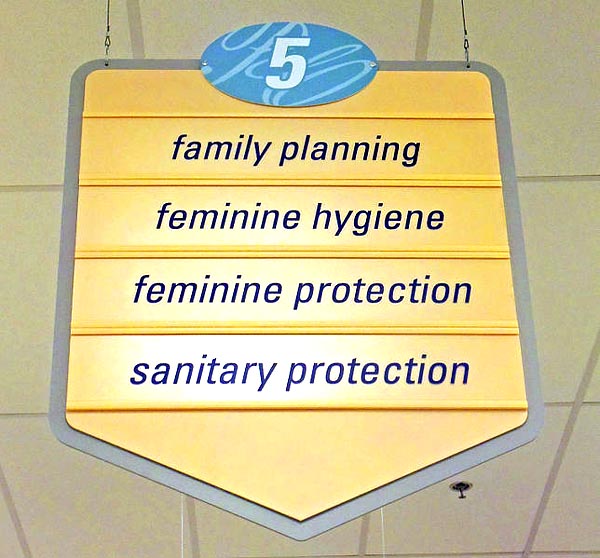 |
| This sign in a drugstore aisle contains four euphemisms. Can you guess what they refer to? Answers below. (Wikipedia) |
Note: Americans are known for speaking directly, but there are still some areas where we should be careful. Comments about someone's appearance, for example, or the way they smell, talk, walk, etc., may be found offensive if they are too direct.
Get Ready: Is it always okay to tell people exactly what we are thinking? Or is it sometimes better to soften our spoken expressions--or even not say anything at all? Try to give some examples where language that is too direct might cause trouble.
Jane, an American, and her Thai friend Lon are chatting.
Jane: It's difficult to find clothes in my size here in Thailand.
Lon: Yes, you are fat.
Jane: Oh! Lon... please don't say that!
Lon: Why not?
Jane: Well, we don't just call a person "fat."
Lon: What do you say?
Jane: We might say, "you're a little heavy," or "you're kind of overweight." But often, we don't comment on the person's differences at all. In this case, you might have just said, "Yes, larger sizes are hard to find."
Lon: But why?
Jane: Well, we don't think being... uh... fat is a good thing. To say it directly is insulting.
Lon: I thought Americans were very direct.
Jane: Well, for many things, we are. But for some things, we use euphemisms.
Lon: You... fam... what?
Jane: Euphemisms. It means something like "good words." It's a way of saying something that has a negative feeling, without being unkind.
Lon: Can you tell me other examples?
Jane: Yes. Instead of saying "She's old," we might say, "She's getting on," or "She's up in years." We wouldn't tell someone a person is "stupid," but we might say he's "not too bright" or "a little slow."
Lon: OK. I think I get it.
Lon may not realize that to an American, "fat" is insulting. We don't particularly mind if you say "you're tall" or "you're short" or "you're thin." (Though, to be honest, some people do get tired of it, and it may be best to keep personal statements like this to yourself, unless you know someone very well.)
A basic rule is: If you're not sure, don't say it. It is better to not say something than to offend someone by saying it.
However, if you absolutely must find out something, you might begin by saying, "Is it alright if I ask you a personal question?" Then, if the person agrees, use somewhat indirect language to ask: "Would you mind telling me how old you are?" or "Could I ask your age?"
This might save embarrassment for both of you.
--------Read more: https://en.wikipedia.org/wiki/Euphemism
Practice: Find what's offensive in each sentence; then find a matching sentence below that sounds more polite.
- (You ask your friend what his cousin looks like) My cousin is an ugly girl.
- (Your friend cooks you dinner) This tastes terrible.
- (Your friend comes in from the gym) Your feet smell bad.
- (You give your boss a report) This is badly-written.
- (Your friend almost falls) You are clumsy.
- This isn't your best work; please try again.
- She has a nice personality.
- You might want to take a shower.
- I had a big lunch; I might not be able to eat much.
- Oh! Be careful!
Answers are in the first comment below.
--------
About the picture above: The sign may be referring to:
- family planning: contraceptives such as condoms
- feminine hygiene: items for women to clean "down below," such as douches
- feminine protection: items for women to use at the time of menstruation, such as pads and tampon
- sanitary protection: adult diapers
Submitted to the Shenzhen Daily for September 26, 2007
This lesson received 2085 visits on my old site between February, 2012, and June, 2021.


Answers to the Practice: 1. b; 2. d; 3. c; 4. a; 5. e
ReplyDelete